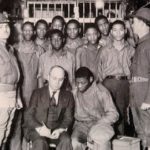Students study select court transcripts and other primary source material from the second Scottsboro Boys Trial of 1933, a continuation of the first trial in which two young white women wrongfully accused nine African-American youths of rape.
Twelve Angry Men: Trial by Jury as a Right and as a Political Institution
Twelve Angry Men, originally written for television by Reginald Rose in 1954 and subsequently adapted for stage (1955), film(1957) and television again (1997), effectively conveys the central importance of the right to a jury trial afforded by Article III of the Constitution as well as Amendments V, VI, and XIV.
Court Shorts: Trial by Jury
Trial by Jury is a right guaranteed by the Sixth Amendment of the Constitution. In this episode of Founding Fundamentals, we focus on the phrase “impartial jury,” also known as a jury of your peers.
Mock Trial Plan
In this lesson, students will stage a mock trial to resolve a hypothetical dispute. They will develop an understanding of the trial process, the roles of those in the courtroom and their importance to the administration of justice, and the significance of their constitutional protections.
Sixth Amendment Activities
Apply landmark Supreme Court cases to contemporary scenarios related to your right to counsel and your right to a fair trial in the Sixth Amendment.
A Conversation on the Right to Trial by an Impartial Jury
Constitutional Index – Amendment 6 Speedy Trial Clause
The Constitutional Index breaks down the U.S. Constitution by Section, Amendment, and Clause and contains broader topics and themes. These are used to cross-reference Library resources in an effort to annotate constitutional history.
FAQs: Juries
Scottsboro Boys and To Kill a Mockingbird: Two Trials for the Classroom

In this lesson, students will perform a comparative close reading of select informational texts from the Scottsboro Boys trials alongside sections from To Kill a Mockingbird. Students analyze the two trials and the characters and arguments involved in them to see how fictional “truth” both mirrors and departs from the factual experience that inspired it.
Lesson Plan: The Emmett Till Story
In this lesson, students will view videos to hear eyewitness accounts of what occurred while Emmett Till was visiting family in Mississippi. They will learn about the timeline of events, how they unfolded and the subsequent trial for the men involved. Students will also consider the impact this had on the Civil Rights movement and the legacy.


